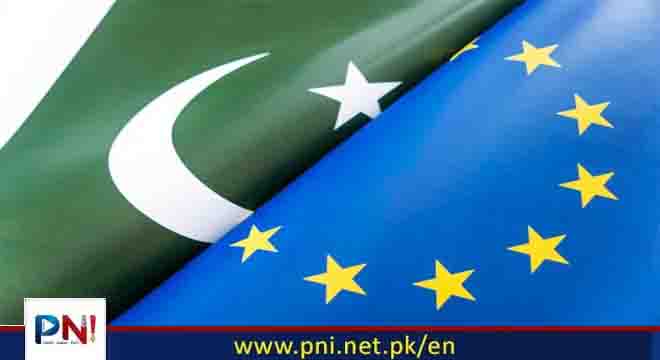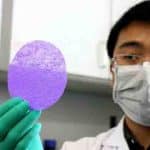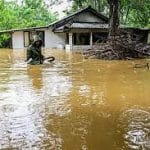ISLAMABAD, Dec 13 : Pakistan and the European Union have agreed to continue cooperation on emerging challenges of food, energy security, and climate change, underlining sustained engagement, particularly in areas such as trade, migration, human rights, political, economic and development cooperation with a focus on the Global Gateway strategy.
The bilateral relations and cooperation were discussed in the 14th Pakistan-European Union (EU) Joint Commission meeting which took stock of recent political developments besides the ongoing formation of the new College of Commissioners, according to a joint press issued Friday on the Joint Commission meeting held recently.
The Joint Commission was preceded by the Sub-Group on Democracy, Governance, Rule of Law and Human Rights in which two sides agreed on the need for continued efforts to strengthen the electoral process. The EU reiterated the importance of political pluralism, democratic values, independent media, vibrant civil society, judicial independence, and international human rights standards, which are key for democratic elections.
Both sides reaffirmed their commitment to the protection of all human rights, including women and children’s rights, labour and migrant rights, as well as fundamental freedoms, such as freedom of expression and opinion including growing problem of disinformation.
Pakistan presented its reform agenda, including in the framework of the National Action Plan on Human Rights, National Action Plan on Business and Human Rights, as well as actions towards the full implementation of 27 international conventions related to GSP+.
Pakistan and the EU also exchanged views on freedom of religion or belief and the rights of persons belonging to minorities and vulnerable groups and concerns about anti-Muslim hatred.
The meeting of the Pakistan-EU Sub-group on Trade also preceded the Joint Commission in which both sides acknowledged the importance of a robust multilateral trading system and exchanged views on recent developments at the multilateral (WTO), plurilateral, and bilateral levels.
Both sides acknowledged that since the grant of GSP status in 2014, the bilateral trade relations have made significant strides.
In the meeting of the Sub-Group on Development, both Pakistan and the EU agreed on the continued relevance of key priority areas under the ongoing Multi-annual Indicative Programme (MIP) including Green Inclusive Growth, Human Capital/TVET, and
Governance including Rule of Law and Human Rights.
The EU presented the details of the projects for the period 2025-2027 following the Mid-Term Review of the MIP and updated on the EU’s policy framework and the Global Gateway. Pakistan appreciated the recent visit of the European Investment Bank in Pakistan held in September this year and agreed on the opportunity to enhance engagement within the framework of the Global Gateway by identifying new investments.
The EU expressed its continued support to Pakistan in developing green and clean energy.
Reiterating their commitment to the Pakistan-EU Strategic Engagement Plan (SEP) signed in 2019, Pakistan and the EU reviewed the state of its implementation, five years on. Pakistan presented proposals to expand bilateral cooperation in additional areas, among others in agriculture, taxation, and disaster risk reduction.
The Joint Commission discussed the progress on joint commitments in the context of the Pakistan-EU comprehensive Migration and Mobility Dialogue, including in the area of return and readmission in the framework of Pakistan-EU Joint Readmission Agreement, as well as in the area of legal migration under the Pakistan-EU Talent Partnership.
The EU reiterated its appreciation for Pakistan’s generosity in hosting Afghan refugees over the decades and welcomed the decision to extend the validity of Proof of Registrations cards of Afghan nationals residing in Pakistan until June 30, 2025. The EU also reiterated its support for the Solution Strategy for Afghan Refugees (SSAR), aimed at providing lasting solutions for Afghan refugees and their host communities in neighbouring countries.
Pakistan also called for an immediate and unconditional ceasefire in Gaza and complete withdrawal of Israeli troops from the occupied Arab territories. The EU reiterated its call for an urgent ceasefire in Gaza; the unconditional release of all hostages; and the urgent and unimpeded humanitarian access and distribution at scale of humanitarian assistance; as well as an enduring end to hostilities in line with UN Security Council Resolution 2735.
Both Pakistan and the EU stressed the need to find peaceful solutions to all conflicts, in full respect of the principles of international law and the UN Charter.
It was agreed to hold the next session of the EU-Pakistan Joint Commission in Brussels in 2025.
Follow the PNI Facebook page for the latest news and updates.









